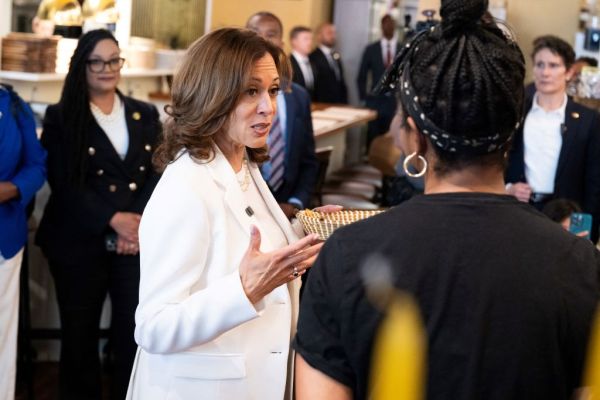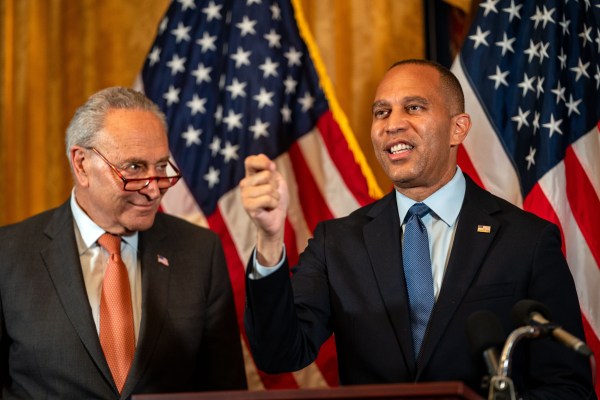The Kamala Harris campaign has proposed substantial tax increases, most of which are in line with the Biden administration budget proposal released back in March. A proposed tax on unrealized capital gains for ultra-wealthy Americans has garnered the most attention, and its critics have pointed out various flaws: It would not be a reliable revenue raiser, it would further penalize saving, and it would face implementation and constitutional challenges. But the real issue with Harris’ tax agenda isn’t any new policies she might introduce, but how she’ll deal with coming changes to existing tax policy.
First, the new taxes: The budget proposal includes a 25 percent minimum income tax on the wealthiest 0.01 percent of taxpayers, which relies on a new definition of income that includes unrealized capital gains. Taxpayers worth $100 million or more would pay a 25 percent minimum tax not just on income generated through wages, business income or the sale of securities, but also on the increased value of stocks and other assets that they have not sold. If you hold a share of stock, and it doubles over a year, you do not need to pay tax on that increase unless you sell the stock. Under the unrealized capital gains proposal, if you are a very high-net-worth individual, you would be taxed on that increase in value whether or not you sell.
In addition to the new tax targeting unrealized capital gains, the administration’s FY 2025 budget also proposes taxing realized long-term capital gains at the same rate as wage income for taxpayers earning more than $1 million. By raising the top ordinary income tax bracket to 39.6 percent, matching the top bracket for long-term capital gains to the top ordinary income tax bracket, and raising the net investment income tax to 5 percent, the Biden budget would put the top combined tax rate on long-term capital gains all the way up to 44.6 percent. This proposal would make the U.S. an outlier internationally. Denmark has the highest capital gains tax of any major European country at 42 percent.
Now, the Harris campaign has recently moderated this proposal, opting instead to raising the long-term capital gains tax rate from 20 percent to 28 percent and raising the net investment income tax to 5 percent. The result is a cumulative federal capital gains tax of 33 percent. While not the highest in the developed world, that would still be well above international norms, given the average long-term capital gains tax rate in the OECD is around 20 percent. Furthermore, that 33 percent doesn’t even take into account state-level capital gains taxes, which are as high as 13.3 percent in California.
One problem with both ideas is revenue volatility. Capital gains, realized or unrealized, fluctuate dramatically year-to-year. Taxing unrealized gains adds a new wrinkle: Imposing such taxes would also suggest asset owners should receive deductions for unrealized losses. In the current context, where we tax realized capital gains, revenue drops precipitously during recessions as asset values fall. With a tax on unrealized gains, the government may need to pay out tax refunds in bad years.
The economic problems with Harris’ capital gains tax proposals have to do with increasing the tax burden on entrepreneurship. In the case of unrealized capital gains taxes specifically, the tax may fall harder on venture capital, angel investors, and other privately held businesses than taxes on realized gains do. Now, it’s worth noting some tax literature suggests a tax on unrealized capital gains would be a more efficient replacement for other taxes focused on capital, such as the tax on realized capital gains or the corporate income tax. But barring a full 180-degree reversal, Harris has not come out in favor of eliminating the corporate income tax. In her 2020 primary campaign, she proposed raising the corporate rate to 35 percent, and so far in 2024 her campaign has stuck to the Biden budget which proposes raising the corporate rate to 28 percent. Even that smaller tax hike would give the U.S. the second-highest corporate tax rate in the OECD after taking state corporate taxes into account.
Lastly, the tax on unrealized gains poses implementation challenges. For one, it introduces a new definition of income to the tax code. The IRS has struggled to implement the corporate alternative minimum tax (CAMT), included in the Inflation Reduction Act, which puts a minimum tax on a new definition of corporate income. The tax is based on book income, which is what corporations report on their financial statements and is not an economically sound tax base. The tax includes numerous adjustments to address (some) of the problems with taxing book income, but all of those adjustments mean extra complexity for both taxpayers and the IRS. Another concern (common to taxes on wealth, like the estate tax) is that taxing unrealized gains in illiquid assets, particularly privately held businesses, would force some taxpayers to liquidate those assets to pay their tax liability.
To be fair, the designers of the proposal have obviously thought about these common pitfalls and tried to offer creative workarounds. Taxpayers would be able to defer the tax on unrealized gains from illiquid assets such as privately held businesses (think a large family business or partial ownership of a major startup). However, they would face an additional deferral charge when the assets are eventually sold. Formulas would be used to attempt to value non-tradable assets: Instead of re-valuing them every year, the IRS would assume they appreciate by the rate of a five-year Treasury bond plus 2 percentage points, until the taxpayer reevaluated. Initially, taxpayers would be able to spread their first year of minimum tax liability out over nine years. They could spread any minimum tax liability in subsequent years out over five years, to prevent liquidity issues. Each creative rule, however, introduces new complexities, new opportunities for tax planning, and for the potential of disputes with the IRS.
The tax also has a potential constitutional problem, but that is another can of worms.
While her capital gains tax proposals are economically harmful and administratively challenging, they’re maybe not even the worst of the policies up for consideration. That honor goes to raising the corporate tax rate to 28 percent, particularly considering recent evidence of the corporate rate reduction and other pro-investment changes from the Tax Cuts and Jobs Act (TCJA) driving new capital investment in the United States. But the real problem with Harris’ support of the Biden tax policies, and where she ought to receive more questions, is how she’ll approach TCJA expirations next year.
At the end of next year, major individual and business tax cuts are scheduled to expire. They include, but are not limited to, reduced personal income tax rates, a higher standard deduction, a larger child tax credit, and the 20 percent deduction for pass-through business income. The TCJA was not just a tax cut either: It included structural reforms like higher limits for the alternative minimum tax and tighter limits to the deductibility of state and local taxes (SALT) and mortgage interest (in concert with the higher standard deduction) simplified the code for millions of taxpayers. The caps to the SALT and mortgage interest deductions also broadened the tax base, partially (but not fully) paying for the substantial tax cuts. Those structural changes would expire too.
Neither the Biden budget nor the Harris campaign have a specific plan for which provisions she would extend, and which she would allow to expire. Instead, the Biden budget would simply extend all the benefits of the 2017 tax cuts for households earning below $400,000. How much would that cost? Well, the budget does not provide an estimate. That is understandable, given it doesn’t specify which policies to extend, and tax modeling is usually easier when one has a proposal to model.
The Committee for a Responsible Federal Budget gave an approximate range of $1.55 trillion to $2.45 trillion for the cost of extending TCJA cuts for taxpayers earning less than $400,000. However, instead of providing an estimate of that magnitude, the Biden budget includes no line item for the cost of the extensions. Yet the Biden budget promises any tax cut extensions will be fully paid for with “additional reforms to ensure that wealthy people and big corporations pay their fair share.”
“Additional reforms.” Namely, tax increases targeted at high-income earners and businesses other than the $5 trillion of tax hikes already included in the budget.
Here is a non-exhaustive list of the tax increases on high-income earners and businesses included in the budget: the capital gains tax increases already discussed, raising the corporate tax rate to 28 percent, quadrupling the excise tax on stock buybacks, taxing unrealized capital gains at death, raising the net investment income tax, expanding the net investment income tax base, taxing carried interest as ordinary income, raising the rate for the already-messy CAMT to 21 percent, a whole host of taxes aimed at international profits, and a few tax penalties on investment in oil and gas.
So, in addition to those—which will be used to raise revenue for their other spending proposals in the budget—they’ve apparently got some other tax increases on the fat cats up their sleeves. Far be it from me to reference The West Wing, but do Biden and Harris have a secret plan to pay for middle-class TCJA extensions? I’m being a little facetious here—but only a little. The majority of taxpayers will see a substantial tax hike in 2026 without an extension of the individual provisions. It’s a big deal that will presumably eat up a lot of Congress’ time next year. It is not too much to ask a presidential candidate for more details on what they want to do about it. Rather than spending time designing Rube Goldberg taxes on unrealized gains, Harris should focus on what she wants to do about the expirations.






Please note that we at The Dispatch hold ourselves, our work, and our commenters to a higher standard than other places on the internet. We welcome comments that foster genuine debate or discussion—including comments critical of us or our work—but responses that include ad hominem attacks on fellow Dispatch members or are intended to stoke fear and anger may be moderated.
With your membership, you only have the ability to comment on The Morning Dispatch articles. Consider upgrading to join the conversation everywhere.